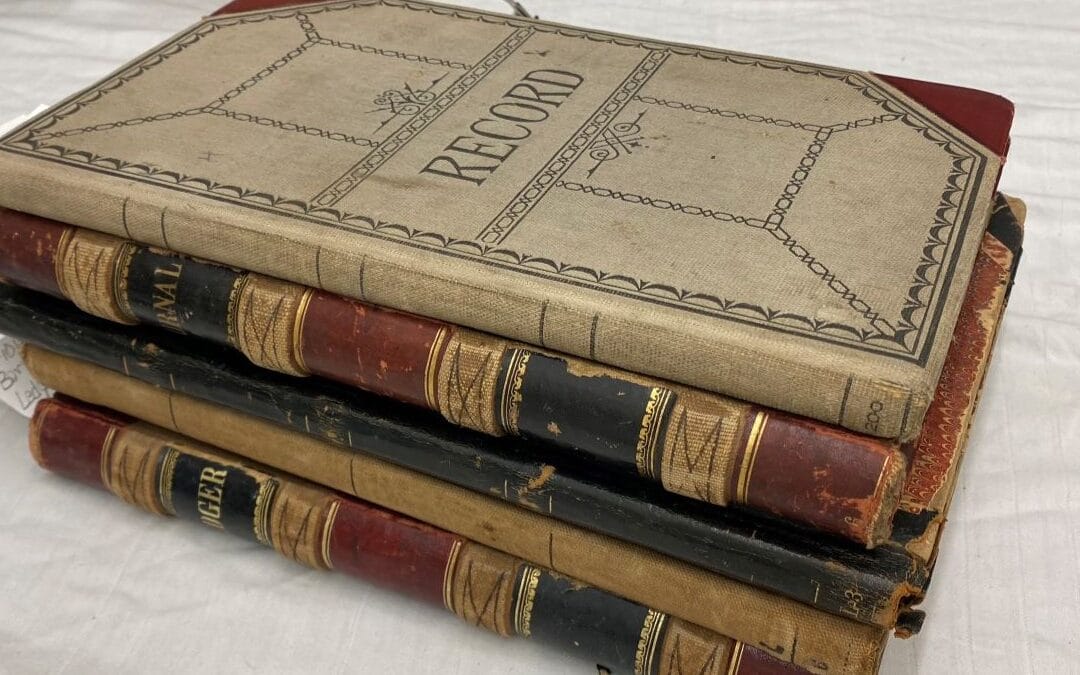Written by Chris Bowles, Museums Manager
In late November last year, I just so happened to poke my head into the office of JoAnna Luth Stull, Greeley Museums’ superhuman Registrar. She was visiting with a gentleman who had come into the museum with some old dusty books that his late wife, a former antiques dealer, acquired in the 1980s. This wasn’t unusual, and I often find JoAnna looking at some interesting artifact or document that “walked in” off the street.
On this occasion, however, JoAnna had a particular glint in her eyes. The gentleman, Richard Borys, it turned out, had brought in five ledgers that he said “mentioned O. T. Jackson”. He knew the name, knew a little about O. T. Jackson’s founding of the short-lived African American town of Dearfield in the early 20th century, and thought we might be interested in these. We were. Very.
Page 1 of ledger 1 that I opened said it was the property of O. T. Jackson! What Mr. Borys had brought to us were all of Oliver Toussaint Jackson’s financial records relating to Dearfield and, excitingly, his time as a prominent restauranteur in Boulder in the later 19th century. JoAnna and I knew we had a real treasure, and, I suspected, an incredibly rare historical resource related to the Black town movement inspired by Booker T. Washington.
The five ledgers contain some incredible details. There are shopping lists with associated costs from one of Mr. Jackson’s restaurants including items like lobster and strawberry ice cream. There are a few records relating to his time as the first manager of the Boulder Chautauqua diner which, from the 1890s onwards, became a landmark of Boulder’s society and tourism. But more importantly are the records about Dearfield. We have detailed accounts of the early set-up of the town, including the establishment of a telephone company. Jackson recorded every payment made to him by a resident of the town for repayment of loans he made to them to purchase their properties. There’s no consistency to these, which suggests arrangements along the lines of “just pay me what you can, when you can”.
I have no doubt that as future researchers pour over these books, the names, stories, successes and, yes, failures of Dearfield will further illuminate this best preserved of Black towns in Colorado. For now, I’m content to know that Mr. Jackson preserved an incredible letter from his long-time friend and former Dearfield resident, Edith “Jenny” Goodall.
It’s perhaps fitting that the letter came to us along with the ledgers just before the Holidays. It was written with a Christmas greeting to O. T. Jackson and his wife Minerva in December, 1920. Jenny recounts the return of some letters that she apparently borrowed from the Jacksons, searching for some now lost nugget of information meaningful to her. But then the letter takes on a dark tone. Jenny seemed to be employed at the time by a large household in Roggen, Colorado. She suspected that her letters were being read before they were sent, so she remains quiet on certain details about the returned letters. It seems she was working alongside a number of other women who she disliked and didn’t trust, which led her to joke that she’d “rather hunt a husband than look for another job”. Jenny and her husband Andrew lived and worked in Leadville, Fort Collins and Boulder, owning several small businesses, before his passing in November, 1919. She may have known the Jacksons from the small African American community living in Boulder around the turn of the century. Her letter to O. T. Jackson is written a little over a year after her husband passed away, and recent research by Maren Bzdek (who I’m grateful to for sharing with me) from the City of Fort Collins Historic Preservation shows Jenny living in a boarding house in Denver. The most troubling comment about Mrs. Goodall’s working conditions follows: “I will be going away, as soon as possible. I don’t mind working but I hate [she actually underlined the word four times] Slavery. I would stay here all winter as they wanted me to but it’s too much shut in and I can just feel my life sapping out for the want of recreation.”
This incredible statement made me tear up as soon as I read it, as I suspect it did O. T. Jackson. It’s maybe no coincidence that this is the only letter preserved in the ledgers which would have been safely locked away in his safe. That fact that it’s uttered on the cusp of the Klu Klux Klan gaining a dominant foothold in state politics, and when Weld County was a hotbed of Klan membership, is, quite simply, stunning.
Over the past few years, O. T. Jackson and his founding of Dearfield have captured the public imagination. As a result, Colorado’s Congressional delegation led by Representatives Buck, Neguse, Crow, and Senator’s Bennet and Hickenlooper, introduced legislation asking the National Park Service to consider Dearfield’s designation as a National Historic Site. This would elevate its status and investment in the site to the level of its sister town of Nicodemus, Kansas. In December last year, shortly after Mr. Borys brought the ledgers into the Greeley History Museum, President Biden signed into law the Dearfield Study Act as part of a legislative omnibus. The starting gun has now been fired for a three-year study and hopefully designation. Regardless of this, Dearfield’s future, and O. T. Jackson’s legacy, are held safely in the hands of the site’s owners, the Black American West Museum. For decades now, the museum’s efforts to preserve Dearfield have been supported by the likes of the State Historical Fund and the National Parks Service through grants for purchasing the site, researching its history and archaeology, preserving its few remaining buildings, mitigating harmful substances and, now, developing plans to create a museum in O. T. Jackson’s house.
It is my fervent hope that one day the ledgers and Jenny Goodall’s letter will return home to this new museum. In the meantime, anyone wishing to explore the ledgers can make an appointment to visit the Hazel E. Johnson Research Center on the website or by calling 970-336-4187.

Businessman and entrepreneur O.T. Jackson kept meticulous notes in these ledgers related to his businesses in both Boulder and Dearfield.
2023.10.0001-.0005, City of Greeley Museums, Gift of Richard & Diane Borys
